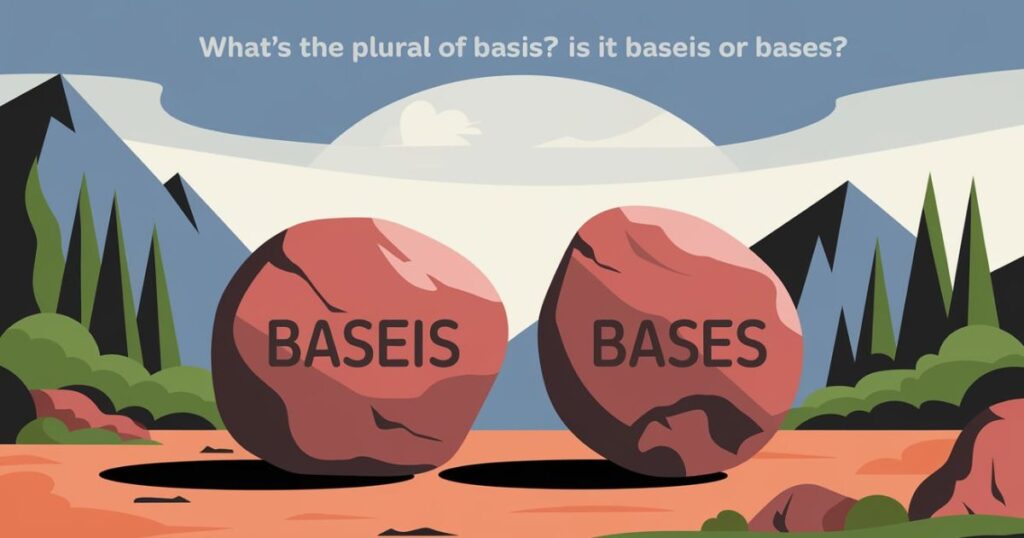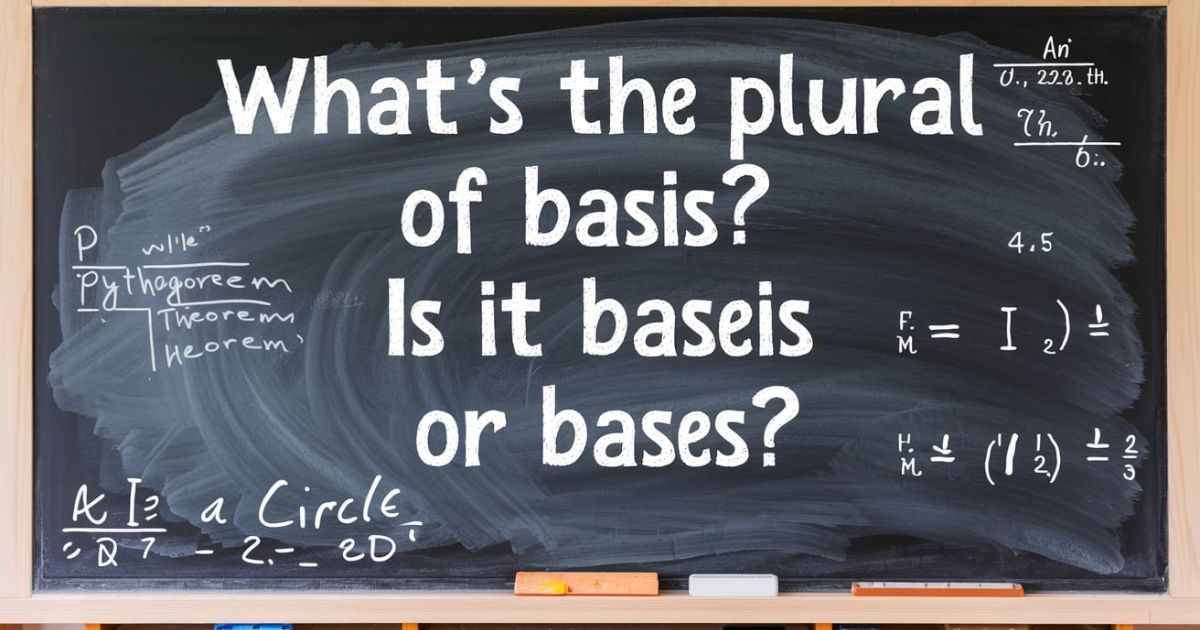Understanding grammar rules can be tricky, especially with words like “basis.” Many English words have unusual plural forms, and “basis” is one of them. You might wonder, “What’s the plural of basis?” Well, it’s not “baseis” or “basises.” The correct plural form is “bases.” Let’s dive into why this is the case and explore some useful tips for understanding similar words.
What’s the plural of basis?”
The plural of basis is bases.
Understanding the Meaning and Origin of “Basis”
Defining “Basis”
The word “basis” is a noun that means the foundation or starting point of something. Think of it as the core idea or the main part of an argument, plan, or theory. For example, the basis of a good diet is nutritious food, just as the basis of a strong argument is evidence. In simple terms, the basis is what something rests upon or relies on.
Origins of the Word “Basis”
The word “basis” comes from the Latin word “basis,” which means “base” or “foundation.” It entered the English language in the 16th century. Because it came from Latin (and originally Greek), it follows special pluralization rules that don’t always match English rules. This is why “basis” becomes “bases” rather than “basises” when pluralized. Words borrowed from Greek or Latin often keep their original plural forms, like “thesis” becoming “theses” and “crisis” becoming “crises.”
READ MORE: How past tense of run Changes in the Past and Past Participle
Why Is the Plural of Basis “Bases”?
Nouns Ending in “-sis” and Their Plural Forms
Many nouns ending in “-sis” have unusual plurals. They often follow rules from Latin or Greek rather than standard English grammar rules. To make these words plural, the “-is” ending usually changes to “-es.”
| Singular | Plural |
| Analysis | Analyses |
| Thesis | Theses |
| Crisis | Crises |
| Diagnosis | Diagnoses |
| Osmosis | Osmoses |
| Sclerosis | Scleroses |
| Neurosis | Neuroses |
| Hypothesis | Hypotheses |
| Parenthesis | Parentheses |
Each word above follows the same pattern, changing “-is” to “-es” in the plural. This makes it a good rule of thumb for similar words, especially when they have Greek or Latin roots.
Why the Plural of “Basis” Causes Confusion
Since most English plurals are formed by adding “-s” or “-es,” people often assume “basis” would become “basises.” However, because of its Greek origin, “basis” follows a different rule. This difference is what often makes words ending in “-sis” confusing. By remembering that words like “basis,” “crisis,” and “thesis” need to change to “-es” in the plural, you can avoid common grammar mistakes.
Using “Basis” and “Bases” in Context
Examples of “Basis” in Sentences
Here are some sentences to show how “basis” works in its singular form:
- “The basis of her decision was careful research.”
- “Trust is the basis of a strong friendship.”
- “The company’s success rests on a solid basis of quality products.”
In these examples, “basis” refers to the foundation or reason behind something.
Examples of “Bases” in Sentences
Now, let’s see “bases” in action as the plural of “basis”:
- “The bases of their arguments were flawed.”
- “We built our ideas on multiple bases, including customer feedback and research.”
- “The project’s success relies on various bases, from teamwork to planning.”
Each sentence shows “bases” used as multiple foundations or starting points.
Synonyms and Alternatives for “Basis”

Sometimes, it’s helpful to use synonyms to vary your language or clarify your meaning. Here are some synonyms for “basis”:
- Foundation
- Groundwork
- Core
- Root
- Principle
- Base
- Source
Using these synonyms can make your writing more engaging and help avoid repetition. For example, you could say, “The core of her plan is safety” instead of “The basis of her plan is safety.”
Why Some Words Are Hard to Pluralize
Some English words follow irregular pluralization rules, often because they have origins in other languages. Words borrowed from Latin and Greek can have unique rules for making plurals, which English sometimes keeps. This is why we say “bases” instead of “basises” for “basis” and “theses” instead of “thesises” for “thesis.” Learning these irregular forms can help you avoid common grammar mistakes.
Further Grammar and Spelling Resources
For more on grammar, including tricky plural forms, these resources are helpful:
- Grammar websites like Grammarly or Purdue OWL
- Dictionaries like Merriam-Webster or Oxford English Dictionary
- English grammar books with sections on pluralization rules
These resources can deepen your understanding of English grammar and improve your writing.
Tips for the Plural of Basis
- Remember that “basis” is one foundation, and “bases” is more than one.
- When you see “-is” at the end of a word from Latin or Greek, check if it follows a unique plural rule.
- Practice using “basis” and “bases” in sentences to get comfortable with their meanings and forms.
FAQ’s
What’s the plural of basis?
The plural of “basis” is “bases,” not “baseis” or “basises.”
Why is the plural of basis “bases”?
Because it follows a Greek plural rule, changing “-is” to “-es.”
Can “bases” mean other things?
Yes! “Bases” can also refer to military stations, places to score in baseball, or foundational chemicals in science.
ALSO READ: What’s the Plural of Software? Is it Software or Softwares?
Conclusion
English grammar has its quirks, and the word “basis” is a perfect example. Remember, the plural of basis is “bases” due to its Greek origin. While this might seem confusing, learning these rules can strengthen your grammar skills. Understanding words like “basis” and “bases” can improve your writing and help you avoid common mistakes.
Sources
- Merriam-Webster Dictionary
- Purdue Online Writing Lab (OWL)
- Grammarly Grammar Handbook

Osbert is a skilled linguist and educator specializing in English grammar and vocabulary. With years of experience, he has dedicated his career to helping learners enhance their language skills. Osbert is passionate about simplifying complex grammar concepts and is the founder of EnglishInfoz.com, a platform focused on English language education.
